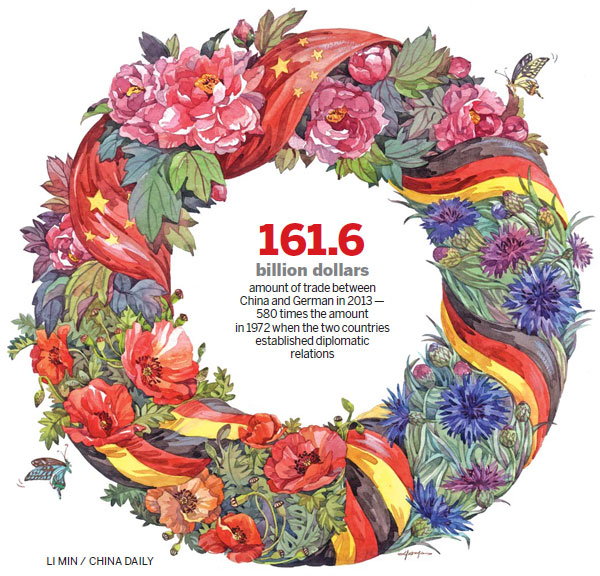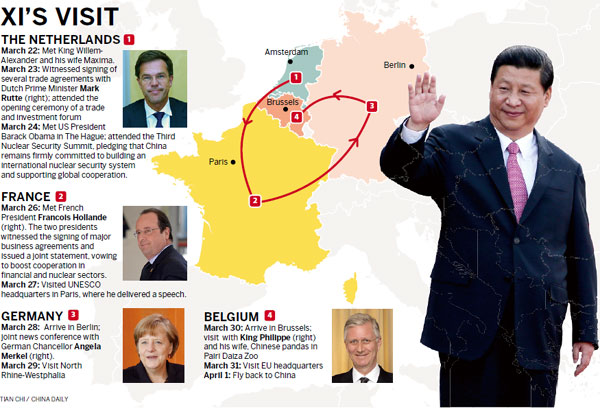Good fit
Updated: 2014-03-28 08:39
By Zhang Chunyan in Berlin (China Daily Europe)
|
|||||||||||


When China and Germany's leaders meet in Berlin, there is much to discuss
When Chinese President Xi Jinping met Germany's Angela Merkel on the sidelines of the G20 Summit in St Petersburg seven months ago, he cited Newton's three laws of motion to describe the relationship - in a nod to the chancellor's antecedents as a research scientist.
Quoting Newton's three laws of motion, he told her that the two countries needed to take full advantage of where they were at in their relationship (inertia), increase their collaboration (acceleration), and eliminate or reduce anything standing in the way (counterforce).
When the pair meet again in Berlin this week, Merkel could well repay Xi the compliment by quoting a Chinese proverb: "Let us take full charge of the past and usher in the future."
The saying is particularly apt as Xi pays his first state visit to Germany over two days from March 28 and as Merkel settles into her third four-year term at Germany's helm after forming a grand coalition with her political rivals in December.
During his visit, Xi will meet Merkel and President Joachim Gauck, business leaders from both countries, and issue a joint statement with her on how they see the relationship developing in the years to come. The two countries will also sign at least 10 substantial agreements.
Business leaders, analysts and industry insiders say that as China, the world's second largest economy, pushes ahead to overhaul its economy and open up more to the world, its relationship with Germany, the world's fourth largest economy, will flourish.
Germany is a particularly important partner for China, given that it is the economic locomotive of the European Union and bears onerous responsibilities in regional and multilateral affairs.

Shi Mingde, China's ambassador to Germany, whose diplomatic duties in the country date back 38 years, is sanguine about the relationship.
"Looking back over more than 40 years of diplomatic relations and how they have developed, there have been difficulties, and twists and turns, but overall they have been sound and stable, and the momentum has been good. History has bequeathed us no problems, and we are unhindered by conflicts of interest."
In fact the leaders of both countries have achieved a remarkable degree of consensus on how they assess the relationship and on how they see it progressing, he says.
Analysts say that thanks to efforts on both sides, the number of exchanges between the two countries has never been higher, and the degree of collaboration between between them has never been better.
When Premier Li Keqiang visited Germany last May, the two countries issued a joint communique announcing that they had reached agreement on 20 issues, and signed 17 inter-governmental agreements and economic and trade contracts with a total value of $8.87 billion (6.4 billion euros).
"Economic cooperation between Germany and China is a remarkable success story," says Alexandra Voss, executive director of the German Chamber of Commerce in China, Beijing, adding that this is reflected in more than just the impressive trade between the two countries.
China and Germany are the largest trading partners to each other in their respective regions, and trade between the two accounts for nearly one-third of China-Europe trade, which is equivalent to the total of China-UK, China-France and China-Italy trade. Last year trade between China and Germany was worth more than $161.6 billion, 580 times that of 1972, when the two countries established diplomatic relations, the Chinese embassy in Berlin says.
China is Germany's third-largest trading partner, the fifth largest-destination country of exports, and the second-largest source of imports in the world.
Cord Eberspaecher, director of the Confucius Institute Duesseldorf, says Xi's visit comes at an important time.
"Good and close relations between China and Germany are more important than ever. Economically, both sides have profited from the growing exchanges and they will continue to do so."
For Gu Junli, a German studies researcher at the Chinese Academy of Social Sciences, how they consolidate and expand their collaboration will be an important matter of discussion for the countries in the future.
In the meantime, German investment in China is growing, the country being Europe's largest investor in China. Investment grew 43 percent, or $2.08 billion, last year. More than 7,500 German companies operate in China, 71 percent of them making a profit.
"We are confident about bilateral cooperation," says Duan Wei, CEO of the China Chamber of Commerce in Germany.
In all kinds of spheres, Germany and its markets hold many attractions for Chinese companies, he says.
However, one difficulty needing attention is that it takes too long for applications for German work permits to be processed, Duan says.
Bureaucratic difficulties notwithstanding, investment by Chinese businesses in Germany through mergers and acquisitions and equity holdings has grown rapidly in recent years, and more than 2,000 such businesses now operate in the country. Last year Chinese businesses invested $830 million, 29 percent more than the year before.
Stefan Fischer, Founder and Executive Director of Cisema GmbH, which advises those wanting to gain access to the Chinese market, says the flourishing relationship between the two countries that is being enjoyed by so many has been achieved only after decades of conscientious, concerted effort.
"Both countries developed a mutual understanding and approached each other on technical, social and legal questions. There are not many other countries like Germany with which China has such strong ties."
Be that as it may, strengthening of economic cooperation between the two is unlikely to be spectacular, he says. That is because the process of deregulation in China will chiefly affect areas in which Germany is not a market leader, such as financial services and IT and Internet services. However, that does not mean Germany will not benefit from China's further opening up, he says.
"Instead I think economic cooperation between the two will grow steadily, but slowly."
Neither should anyone think that a free trade agreement between China and the EU is just around the corner, says Claudia Schmucker, head of the Globalization and World Economy Program of the German Council on Foreign Relations.
"There will be no free trade agreement between the EU and China in the near future, but the economic ties will increase on a large scale."
Of all European countries, Germany provides the most technology transfer to China. Observers say the economic collaboration between Germany and China will increase and consolidate, the two being strong export-oriented countries that complement one another extremely well.
"Especially important are the increasing mutual direct investments as they can help the economies of both countries achieve new synergy," says Mechthild Leutner, a professor for Sinology at the Freie Universitaet Berlin.
At present, China is in a critical period of transforming and upgrading, she says, while Germany boasts advanced technologies and management experience as well as outstanding advantages in fields of China's priority of development such as high-end manufacturing, energy saving, environmental protection and green economy.
Germany and China can reinforce their collaboration in the automotive and mechanical engineering industry, in which Germany is preeminent, Fischer says.
A survey by the industry group Verband der Automobilindustrie last year found that China is one of the most important markets for German mechanical engineering, so there is a lot of scope for more collaboration, he says.
"With high-end machinery, China still needs a lot of time before it reaches Germany's level. However, the Chinese mechanical engineering industry controls much of the lower price segment markets and has become a strong export-oriented sector. Germany controls much of the high-end price segment markets."
In both countries the industries aim to move into the space between the high-end and low-end markets, he says. This means that if the German mechanical engineering industry is to grow it must move toward the center. The Chinese industry must do likewise, improving incrementally.
"Both countries will meet in the middle segment market in the coming years, where competition will then take place. But I don't think that this increased competition in the middle price segment market will result in less cooperation between China and Germany.
"Of course, some companies on both sides will experience losses and will probably be unable to (survive), but this is the nature of market competition."
Underlying China's economic relations with Germany, as with other countries, is the plan adopted at the Third Plenary Session of the 18th CPC Central Committee last November for comprehensively deepening reforms, which will not only gradually change the face of China, but also offer tremendous opportunities for it and the rest of the world to work together.
Other initiatives China has taken over the past year have included giving greater access to investment, establishing the Shanghai free trade zone and constantly opening up more, providing German business with huge new opportunities.
When Premier Li was in Germany last year he said the growing "Made in China" and the mature and reliable "Made in Germany" were a perfect match.
Voss of the German Chamber of Commerce in China says areas of particular interest include sustainable growth, protecting natural resources, fostering domestic innovation and improving infrastructure in rural areas.
"German companies want to play a key role in achieving these goals and have the know-how and experience to execute respective projects with their Chinese partners," she says.
Research collaboration and the development of new technologies that can guarantee sustainable development related to climate and environmental protection are important, Leutner says.
This has implications not only for bilateral economic relationships but also for using resources with a clear eye to the future as well as guaranteeing a satisfactory quality of life for everyone, she says.
"There is a lot of potential to cooperate in green technology," Schmucker of the Globalization and World Economy Program of the German Council on Foreign Relations says.
"Germany has the Energiewende (transitions in energy) and German business plays a strong role and has a strong research and development focus on green technology. This issue is also becoming more and more important for China."
So both countries could benefit if they improve their coordination in this field instead of fighting trade wars, for example over solar panels, Schmucker says.
Just days before Xi's visit to Europe, China and the European Union agreed to end a dispute over European wine exports to China.
Beijing opened an inquiry last year into whether Europe was selling wine in China at unfairly low prices. The move was seen in Europe as retaliation over EU efforts to impose punitive import duties on Chinese solar panels.
The solar panels dispute was resolved, but China pressed ahead with the wine case, saying it was a separate issue despite European expectations that the inquiry would also be dropped.
Yet for the various matters of dispute there are many areas in which both countries have a lot of scope to work together. Peter Hefele, Peter Hefele, head of the China office of the Konrad-Adenauer-Stiftung, Shanghai, a foundation linked to the Christian Democratic Union party, says: "Providing highly qualified services around products is a huge advantage of German companies and a weakness of most Chinese producers. In this field one could see some potential for deeper cooperation.
"Apart from hard products like cars, the demand for soft products such as media and culture is increasing among China's middle class."
China and Germany have enjoyed increasingly closer exchanges in culture, education and people-to-people engagement.
Every week, more than 60 direct flights go to and from the two countries, and in 2012 the number of tourists traveling between China and Germany exceeded 1.1 million.
China is becoming an important hub for German companies' research and development activities, too. But, Hefele says, shortcomings in intellectual property rights regulations and enforcement remain an obstacle to fully unleashing the potential of China's creativity.
More opportunities will emerge in areas where German companies have a lot to offer and China's respective industries are in high demand, for example in the medical industry, Voss says.
China provides growing sales opportunities in these areas and German companies are eager to supply products and services to help advance them.
"For German companies China is not merely a place to sell modern technology," Voss says. "It is also a partner for technology cooperation."
Chinese companies are increasingly becoming global actors in innovation. Germany has a high interest in a China with a strong innovation capacity because Germany's economic success is particularly effective in working with countries that are technologically strong.
Zhou Xiangqian, managing director of the Sino-German Innovation Center in Duesseldorf, is fostering innovation projects that attract talent, technology, capital and market from both countries together.
Both sides have strengths and requirements in many areas, Zhou says, and the most important thing is to create innovation projects by analyzing and fully mobilizing resources.
Germany also plays a leading role in China's relationship with Europe, analysts say.
"Germany plays a dominant role in promoting China-EU ties," says Gu, of the Chinese Academy of Social Sciences. "In the future, Berlin can contribute more to removing the differences over trade issues, including solar energy products, between China and EU."
Schmucker says Germany will play a central role in discussions on the EU's relationship with China. Germany tends to speak out against trade sanctions towards China and is interested in fostering a closer economic relationship.
Besides trade disputes, experts expect Germany to take a leading role in negotiations for an EU-China investment agreement that began recently.
"Berlin can also play a more positive role in conducting EU-China negotiations on an investment agreement," says Chen Zhimin, chair of the department of International Relations and Public Affairs at Fudan University.
Investment by Chinese companies in Germany and Europe is still relatively low compared with German and European investment in China. Investment by China in Germany is relatively small and is still in its infancy, according to figures from the Chinese embassy in Berlin.
By the end of September, accumulative investment in German non-financial sectors by Chinese enterprises had reached $3.8 billion, accounting for just 0.2 percent of foreign investment in Germany, ranking 27th, and only 10 percent of German investment in China.
"We believe that an increase of Chinese investment in Germany is a positive development because it generates growth and employment," Duan says.
For German business it is important that the investment agreement that is now being negotiated gives easier market access to German and European companies in China and increases legal certainty, Chen says.
Leutner of the Freie Universitaet Berlin says: "Germany can definitely function as an engine to promote EU-China relations. Having a good EU-China relationship can make an important contribution to the stability of a multipolar world."
Philipp Neumann contributed to this story.
(China Daily European Weekly 03/28/2014 page1)
Today's Top News
Partnership with Belgium, EU highlighted
Turkish PM wins local elections
Monday's search for MH 370 resumes: AMSA
Families of flight MH370 passengers 'need closure'
Greece passes new reform bill
Dobass demonstrators demand referendum
MH370 relatives demand answers
Turkey starts local elections
Hot Topics
Lunar probe , China growth forecasts, Emission rules get tougher, China seen through 'colored lens', International board,
Editor's Picks

|

|

|

|

|

|





